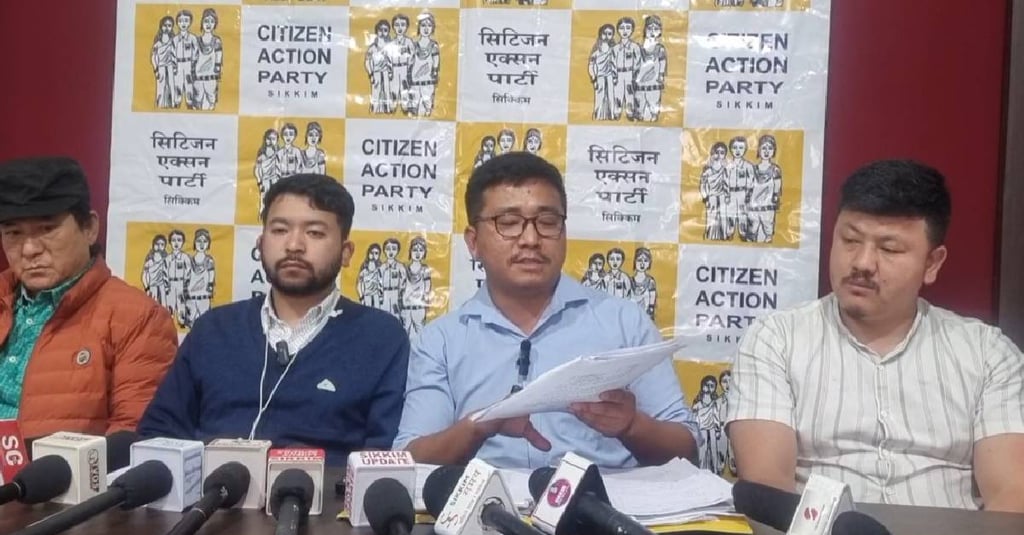Citizen Action Party slams Sikkim budget 2025-26, calls it anti-people and misleading
Another major point of criticism was the government’s claim of rapid economic growth. The CAP-S leaders argued that while the government presents impressive economic figures, the actual situation on the ground tells a different story.
LOCAL


The Citizen Action Party-Sikkim (CAP-S) has launched a scathing attack on the recently presented Sikkim Budget 2025-26, calling it deeply flawed, misleading, and disconnected from the ground realities of the state. In a press conference held in Gangtok, party spokespersons Pratashi Bhutia, Albert Gurung, and Karmachari Bhatia expressed their disappointment, stating that the budget does nothing to address the struggles of ordinary citizens. According to them, the budget fails to provide any meaningful relief to the unemployed youth, farmers, small business owners, and rural populations who continue to struggle under financial difficulties.
The CAP-S leaders were particularly critical of the government's claims regarding Sikkim’s economic prosperity. They argued that while the state boasts one of the highest per capita incomes in the country, this statistic does not reflect the reality faced by the common people. They accused the government of painting a rosy picture of economic growth while ignoring the increasing hardships of the people. Despite the government’s repeated claims of progress, they said, unemployment remains high, basic infrastructure is in a poor state, and financial distress among families is growing.
One of the key issues raised by the party was the problem of unemployment in the state. The leaders pointed out that thousands of educated youth in Sikkim remain jobless, with no clear government policy to provide them with employment opportunities. They questioned why the budget did not introduce any major initiatives to create jobs or support self-employment. The spokespersons argued that without a structured plan for job creation, young people in Sikkim are being forced to migrate out of the state in search of work. They also criticized the government for failing to promote industries that could generate employment within the state. According to them, there are no concrete efforts to boost local entrepreneurship, nor are there any policies that would help small businesses thrive.
Another major concern highlighted by CAP-S was the government’s failure to support the agricultural sector. Agriculture remains one of the primary sources of livelihood in Sikkim, yet the budget does not include any significant allocations for farmers. The leaders accused the government of neglecting the rural economy and failing to provide financial assistance to those engaged in farming. They pointed out that despite the government’s promotion of organic farming, there is a severe lack of infrastructure to support farmers. Many farmers are unable to sell their produce at profitable rates due to poor marketing facilities and the absence of direct market access. Additionally, the lack of irrigation facilities and modern farming equipment continues to make farming an unsustainable occupation for many. The CAP-S leaders questioned how the government expects the agricultural sector to flourish when farmers are not given the necessary resources and support.
The issue of infrastructure was also a key point of criticism during the press conference. The party members spoke at length about the deteriorating condition of essential services such as water supply, electricity, and roads. They particularly highlighted the ongoing water crisis in Ravangla Bazaar, where residents have been facing acute water shortages for a long time. Despite repeated complaints from the public, the government has failed to take any substantial action to resolve the crisis. The CAP-S leaders said that the government’s negligence towards this basic necessity shows how disconnected it is from the people’s real problems.
In addition to water shortages, the party also pointed out the frequent power cuts and the poor condition of roads in several parts of Sikkim. According to them, many areas experience long hours of electricity outages, making it difficult for businesses and households to function smoothly. Meanwhile, roads in several regions remain in a state of disrepair, making transportation difficult and unsafe. The leaders criticized the government for not allocating sufficient funds to improve these essential facilities. They questioned why the budget prioritizes other expenditures while ignoring the everyday struggles of common people who have to deal with these infrastructural deficiencies.
The CAP-S leaders also raised concerns about the rising debt burden of the state. They alleged that the government has been borrowing excessively without any clear plan for repayment. The increasing debt, they said, could have severe long-term consequences for the state’s financial stability. They accused the government of mismanaging funds and failing to use public money effectively. If borrowing continues at this rate, they warned, the state could soon find itself in a financial crisis that would impact future generations. They also questioned whether the borrowed funds were being used for real development or whether they were being spent on projects that benefit only a select few.
Another major point of criticism was the government’s claim of rapid economic growth. The CAP-S leaders argued that while the government presents impressive economic figures, the actual situation on the ground tells a different story. They stated that despite claims of high per capita income, many families in Sikkim are struggling to make ends meet. Rising prices of essential commodities, lack of job opportunities, and poor government support have made life increasingly difficult for many citizens. The leaders accused the government of using misleading statistics to create the illusion of progress while ignoring the real economic distress that people are experiencing.
The Citizen Action Party-Sikkim demanded that the government revise the budget and introduce policies that directly benefit the people. They called for urgent measures to address unemployment, rural distress, infrastructure problems, and financial mismanagement. They emphasized that the budget should be people-centric rather than focusing only on statistics that look good on paper. They also urged the public to stay informed about government policies and demand better governance.
